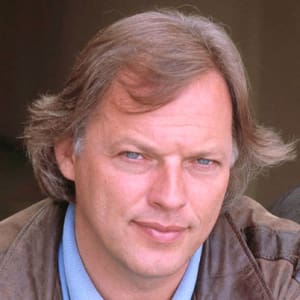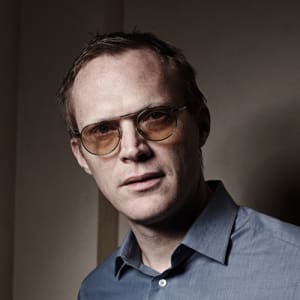
David Gilmour
A guitarist, singer, writer and producer for the British rock group Pink Floyd, David Gilmour brought to life such hit songs as ‘Comfortably Numb’ and ‘Money.’
Synopsis
Born in England in 1946, David Gilmour joined the progressive rock group Pink Floyd in 1967. As the lead guitarist and a vocalist, he helped the group achieve international success with albums such as The Dark Side of the Moon and The Wall. Gilmour has also released four solo albums, is an experienced pilot and is known for his work with charities around the world.
Early Life and Career
David Jon Gilmour, the first child of Douglas and Sylvia Gilmour, was born on March 6, 1946, in Cambridge, England. He went to school with Syd Barrett and knew Roger Waters, who went to a school nearby. As a teenager, Gilmour learned to play the guitar, and from 1962 to '66, he played in a band called Joker's Wild. After he left the band, he traveled around Europe as a busker for a year. He barely made enough to live, however, and was hospitalized for malnutrition.
Pink Floyd
Late in 1967, Pink Floyd drummer Nick Mason asked Gilmour to join the band. Founding guitarist Syd Barrett was floundering because of heavy psychedelic drug use, and the group hired Gilmour as a second guitarist to cover for him. Barrett left the band in early 1968, leaving Gilmour to become the lead guitarist and vocalist.
The band achieved enormous commercial success with albums like The Dark Side of the Moon, and Waters began to assert greater authority and control. Waters wrote the bulk of Animals and The Wall without first getting input from his bandmates, and tensions mounted. Gilmour felt that his talents weren't being utilized, so he began working on his own projects. In 1978, after recording Animals with Pink Floyd, Gilmour released his first solo album. One of the songs written too late to be included on the album became one of Pink Floyd's signature tracks, "Comfortably Numb."
The relationship between Gilmour and Waters continued to deteriorate, and Gilmour produced his second solo album, About Face, in 1984. He later said that recording the album was a way to distance himself from Pink Floyd. When Waters left the group in 1986, Gilmour stepped to the helm and produced A Momentary Lapse of Reason. He and Mason also teamed up to fight Waters, who filed a lawsuit with the intent of preventing the remaining band members from using the name Pink Floyd.
Returning to the studio, Gilmour and keyboardist Richard Wright did much of the heavy lifting for Pink Floyd's 1994 album The Division Bell. In 2014, six years after Wright's death, Gilmour used material from earlier sessions to produce The Endless River, expected to be the iconic band's final studio effort.
Solo Career
Gilmour has released four solo albums over the course of his career. In addition to the two that he recorded while with Pink Floyd, he released a third album, On an Island, on his 60th birthday in 2006, and a fourth album, Rattle That Lock, in 2015. Gilmour also produced and co-wrote the tracks for Metallic Spheres, an album released in 2010 by the British electronic group The Orb.
Personal Life
Gilmour has been married twice. He married Ginger Hasenbein in 1974, and they had four children together before divorcing in 1990. In 1994, Gilmour married novelist Polly Samson, and they had four children of their own. He later confessed that he had a cocaine problem while he was touring with Pink Floyd, but quit after he met Samson.
While not playing music, Gilmour often takes to the skies. He is a pilot and, for a time, collected antique aircraft auspices of his company, Intrepid Aviation. He has since sold the company, but kept a biplane for his personal use.
Appointed Commander of the Order of the British Empire in 2003 for his services to music, Gilmour is actively involved in philanthropy. That year, he sold his home in West London and donated the proceeds—more than $5.5 million—to Crisis, a nonprofit organization that works to provide services to the homeless. Gilmour has also been involved with Oxfam, Greenpeace and Amnesty International, among other charitable organizations.



